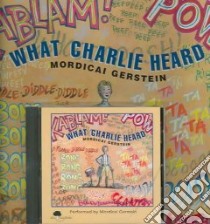What Charlie Heard - 9780374382926
Un libro in lingua di Mordicai Gerstein edito da Farrar Straus & Giroux, 2002
- € 13.20
- Il prezzo è variabile in funzione del cambio della valuta d’origine
The extraordinary story of the composer Charles Ives.
"Sometimes little Charlie lay in his crib just listening. He heard
his mother's long dress as she moved around his room. He heard big clocks and little clocks. He heard wagons and horse hooves. He heard dogs and crickets and the church bell next door."
Charlie listened all through his boyhood, and as he grew into a man, he found he wanted to re-create in music the sounds that he heard every day. But others couldn't hear what Charlie heard. They didn't hear it as music – only as noise. In this daring and original book, Mordicai Gerstein graphically translates the audible into the visible – filling his pictures with noise – to tell the story of Charles Ives (1874–1954), a great musical innovator who let neither criticism nor public scorn keep him from composing music that expressed all that he heard in the world. He was finally recognized with a Pulitzer Prize in 1947.
"Sometimes little Charlie lay in his crib just listening. He heard
his mother's long dress as she moved around his room. He heard big clocks and little clocks. He heard wagons and horse hooves. He heard dogs and crickets and the church bell next door."
Charlie listened all through his boyhood, and as he grew into a man, he found he wanted to re-create in music the sounds that he heard every day. But others couldn't hear what Charlie heard. They didn't hear it as music – only as noise. In this daring and original book, Mordicai Gerstein graphically translates the audible into the visible – filling his pictures with noise – to tell the story of Charles Ives (1874–1954), a great musical innovator who let neither criticism nor public scorn keep him from composing music that expressed all that he heard in the world. He was finally recognized with a Pulitzer Prize in 1947.
The extraordinary story of the composer Charles Ives.
"Sometimes little Charlie lay in his crib just listening. He heard
his mother's long dress as she moved around his room. He heard big clocks and little clocks. He heard wagons and horse hooves. He heard dogs and crickets and the church bell next door."
Charlie listened all through his boyhood, and as he grew into a man, he found he wanted to re-create in music the sounds that he heard every day. But others couldn't hear what Charlie heard. They didn't hear it as music – only as noise. In this daring and original book, Mordicai Gerstein graphically translates the audible into the visible – filling his pictures with noise – to tell the story of Charles Ives (1874–1954), a great musical innovator who let neither criticism nor public scorn keep him from composing music that expressed all that he heard in the world. He was finally recognized with a Pulitzer Prize in 1947.
"Sometimes little Charlie lay in his crib just listening. He heard
his mother's long dress as she moved around his room. He heard big clocks and little clocks. He heard wagons and horse hooves. He heard dogs and crickets and the church bell next door."
Charlie listened all through his boyhood, and as he grew into a man, he found he wanted to re-create in music the sounds that he heard every day. But others couldn't hear what Charlie heard. They didn't hear it as music – only as noise. In this daring and original book, Mordicai Gerstein graphically translates the audible into the visible – filling his pictures with noise – to tell the story of Charles Ives (1874–1954), a great musical innovator who let neither criticism nor public scorn keep him from composing music that expressed all that he heard in the world. He was finally recognized with a Pulitzer Prize in 1947.
Informazioni bibliografiche
- Titolo del Libro in lingua: What Charlie Heard
- Lingua: English
- Autore: Mordicai Gerstein
- Editore: Farrar Straus & Giroux
- Collana: Farrar Straus & Giroux (School And Library)
- Data di Pubblicazione: 18 Marzo '02
- Genere: JUVENILE NONFICTION
- Argomenti : Composers United States Biography Juvenile literature Composers
- Dimensioni mm: 247 x 273 x 6
- ISBN-10: 0374382921
- EAN-13: 9780374382926


